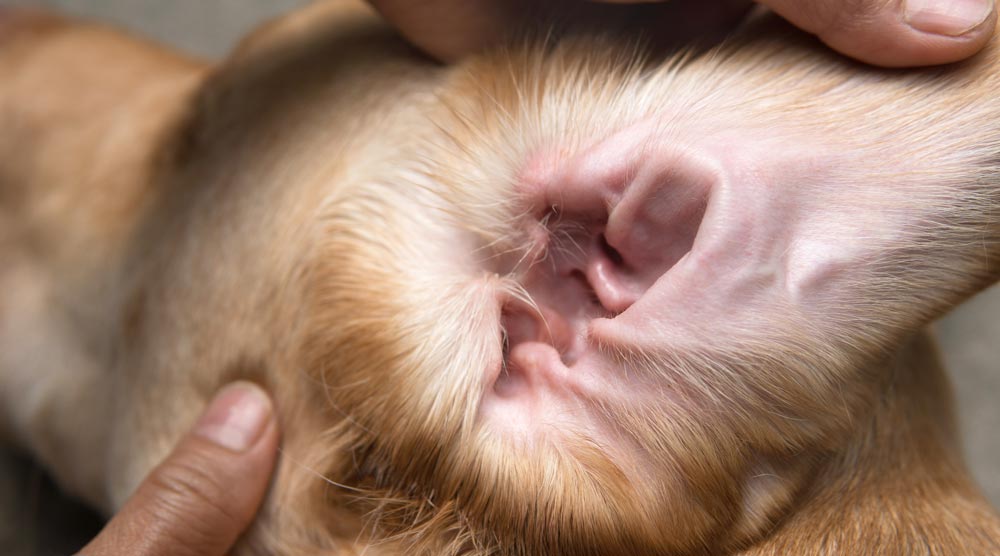We don’t know exactly why dogs tilt their head, but there are several strong theories. Here’s an overview of the most likely reasons for head tilting – including when you should contact a vet.
Contents
There are several theories about why dogs tilt their heads. These include that the dog is attempting to hear better, see better, or even that it’s a learned behavior. There are also certain medical conditions that can cause head tilting.
Let’s take a closer look at some of the most plausible reasons why dogs tilt their heads to the side.
Why Do Dogs Tilt Their Heads?
1. Head Tilting Helps a Dog Hear Better
Science tells us that dogs have more sensitive hearing than humans, but they have difficulty locating where sounds are coming from.
Some dogs may tilt their head to change ear positions, which allows them to pinpoint a sound’s location. The ear flap, known as the pinna, has over 17 muscles, and these can be manipulated to allow your dog to tune into a sound more accurately.
The pinna is more obstructive for some breeds, so these dogs may be more likely to tilt their head. Breeds with pendulous ear flaps, like basset hounds, for example, may cock their head and prick their ears to reposition the pinna and open up the ear canal.
Of course, this doesn’t explain why a dog tilts his head when you’re speaking and he’s already looking directly at you.
In this case, adjusting the ears may help the dog to hear what you’re saying. This is more likely when you’re talking in an excited voice, as the dog is listening for words he might understand (such as “walkies” or “dinner”). It’s also common if you’re making a strange noise that the dog doesn’t recognise.
2. Tilting May Help a Dog to See Your Facial Expressions More Clearly
Studies show that dogs can read our facial expressions. This means it’s important for a dog to see a human’s face when he’s struggling to understand what’s being communicated.
Of course, this doesn’t mean that dogs understand what we’re saying (aside from cues we’ve taught them, such as “sit.”) But our canine companions often rely on body language, facial expressions, and tone to judge whether the person is feeling a positive or negative emotion.
Unfortunately, a dog’s snout often obscures part of a person’s face. To counteract this, the dog may tilt his head to change the muzzle position and see your expressions more clearly.
If you’re interested in how your dog sees the world, try placing your fist in front of your nose to simulate a muzzle. When speaking to someone, your fist will likely block part of their mouth. Tilting your head to the side allows you to see their full expression.
A small scale study seems to back up this assertion. It discovered that brachycephalic dogs, with shorter snouts and flatter faces, tilt their heads less than breeds with longer muzzles, like greyhounds. However, lots of flat-faced breeds still head tilt, so this can only be part of the explanation.
3. Tilting The Head May Signal Curiosity
Dogs tend to tilt their heads when they are curious about a noise. While this could help the dog to read your expression or identify where the sound is coming from, it could simply be a canine version of a confused or intrigued expression.
There’s plenty of anecdotal evidence to back this up. Many owners notice, for example, that their dog tilts his head when he spots another dog on the TV.
4. Some Dogs May Head Tilt to Get a Positive Reward
If you find it cute when your dog cocks his head, you might start offering affection and praise. Once your dog realizes they get rewarded for tilting their head, this may motivate them to do it more.
Positive reinforcement doesn’t explain why dogs tilt their head in the first place. But it could be why some dogs do it more than others.

Research Shows Head Tilting May Be a Sign of Empathy
There’s evidence that dogs who tilt their head are more empathetic. If you’re having a bad day and feeling stressed, your dog may tilt their head as a way of letting you know they’re engaged and listening.
Just because your dog doesn’t tilt his head isn’t a cause for concern though. As mentioned earlier, some breeds are less likely to tilt their head, especially those with a short snout or pointy ears.
When is Head Tilting a Medical Problem?
Regular head tilting that’s unrelated to a noise or interaction may indicate a medical problem.
Head tilting can sometimes be caused by vestibular disease, which affects the dog’s balance. Vestibular disease can either occur in isolation or be triggered by other conditions. Aside from head tilting, symptoms include loss of balance, jerking eye movements, disorientation, nausea, and a reluctance to stand up.
A variety of other conditions can cause head tilting. Some examples include:
- Ear infection/injury. If your dog has suffered trauma to their ear, or developed an infection, this can cause pain and affect their balance. It can also cause your dog to tilt and shake their head. Ear infections are one of the most common medical reasons for a head tilt, and one of the easiest to treat and resolve.
- Brain conditions. While rare, brain tumors and infections like meningitis can result in head tilting behavior. Strokes and trauma can also cause this behavior.
- Nutritional deficiency. A thiamine deficiency can sometimes cause balance problems, although this is rare. If your dog is on a high-quality and well-balanced diet, this isn’t a likely concern.
- Hypothyroidism. Dogs with low thyroid function can experience neurological symptoms, including balance issues and head tilting.
If you notice your dog has a persistent or unusual head tilt, you should take them to the vet immediately.
Summary
There are several reasons why dogs might tilt their heads. Your dog may be trying to hear something more clearly, pinpoint its location, or get a better view of your face. Tilting could even just be an expression of curiosity or empathy.
A persistent head tilt, however, may indicate an underlying issue with your dog’s balance. This can be caused by a variety of medical conditions, so it’s important to consult a vet.


